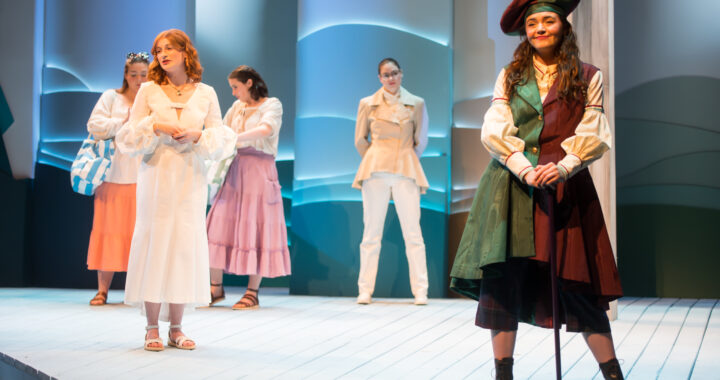Manga and anime become increasingly popular at UMW
4 min read
Squid Game is one example of a show that gained popularity on American streaming platforms. Jonas Augustin / Unsplash.com
by BEN SWEENEY
Staff Writer
Manga and East Asian shows—both live-action and anime—have gained a huge following over the past few years, including at UMW. Although they have long been popular, there appears to have been a spike in popularity in recent years.
According to statistics of sales taken from NPD Bookscan, the top-selling graphic novels that were sold in Oct. 2021 were all manga with the top three titles being My Hero Academia, Demon Slayer and Chainsaw Man. For many years, it seems manga has dominated the graphic novel section of book sales, outselling most American comic book publishers, including the famous DC Comics, Marvel Comics and Image Comics.
Though characters like Superman, Batman and Spider-Man have all become staples in American culture, Japanese entertainment is also popular and well-known. Netflix has recently adapted the anime classic Cowboy Bebop into a live-action series, and another classic anime called One Piece is scheduled to be released sometime in the near future. The movie Demon Slayer: Mugen Train smashed all box office records around the globe, becoming the highest-grossing animated film from Japan since My Neighbor Totoro.
It is not just Japan that has made some incredible profits around the globe; the Korean show Squid Game has become Netflix’s most-watched TV series in the streaming platform’s history. The show features powerful scenes of brutality and violence, but it has garnered an incredible following since it was first introduced to audiences worldwide.
“The first anime I ever watched was Sailor Moon when I was around 5 because I thought those characters looked really pretty,” said Eliza Vegas, a sophomore historic preservation major. “However, after that, I never touched anime since I just didn’t really think I’d enjoy it, and some of the art styles were unappealing to look at. But then, last semester, my roommate decided to put on an episode of Banana Fish, and [I] caught a glimpse of it and was like, ‘Oh, hey, that looks cool, I’ll watch it.’ So I watched it and then that spiraled into watching a bunch of other anime my roommate recommended.”
Students at UMW are just some of the people in the country who have a fondness for anime and manga. Several rooms on campus have posters of Monkey D. Luffy (One Piece), Edward Elric (Fullmetal Alchemist) and many more anime characters. There is also a Japanese Anime club on campus and a popular Japanese language class taught by adjunct instructor Rina Okada.
Okada, originally from Kyoto, expressed delight at Japanese culture’s popularity in the United States.
“It does make me happy,” she said. “I was in the U.S. for study abroad in 2012, and how it was back then and now are completely different. I don’t see many Asian people here in Fredericksburg, but Japanese restaurants are everywhere. I believe this is because of anime, so I appreciate that. I appreciate that more people are aware of Japanese culture.”
When asked about how Americans have come to admire the Japanese entertainment industry, Okada said, “I am very proud of it. Even things like Animal Crossing that people here don’t really think is Japanese … it makes me proud of my home country when I see so many American people enjoying it.”
As far as anime recommendations, Okada recommends Kaguyasama, Polar Bear Cafe and Attack on Titan. For manga, she recommends Black Butler, Bleach and Gintama.
Many American entertainment industries have included modern-day problems that occur in the real world, such as racism, sexism and critiques on capitalism. While some shows, such as Squid Game, tackle real-world crises and problems like these, they do not tend to beat the audience over the head with it or let it interfere with the story.
While these themes are important, people also enjoy consuming stories that let them escape from the problems of the real world. What better way to experience this than by reading a manga about a guy who kills demons with chainsaws, such as Chainsaw Man? Or perhaps people would rather read about vampires killing Nazis, such as in Hellsing?
Manga and anime are not just about fighting and heroism though; they have a variety of genres such as romance, mystery, science fiction and sports. With manga, there is something for everyone, while American comics usually just feature a superhero and a plot about how they save the world.
“While I enjoy both manga and American comics, I prefer manga because there is a much wider variety of genres offered!” said Neonya Garner, a sophomore history and education major. “American comics are usually sci-fi or hero stories whereas manga offers both those categories as well as others such as fantasy, romance, sports, etc.” For manga recommendations, Neonya picks Chainsaw Man, Paradise Kiss and Blue Lock.
The popularity of anime and manga grows by the day, and it seems like the creative machine in these nations isn’t going away any time soon. It is all the better for us across the sea who just can’t get enough.











